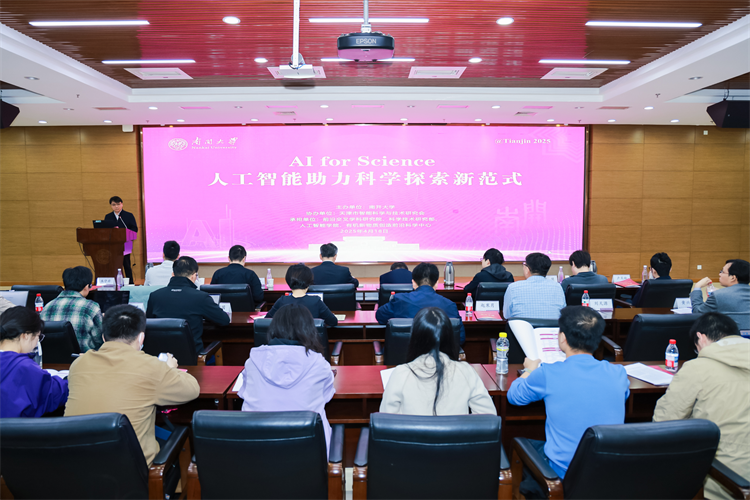“AI for Science: New Paradigm for Artificial Intelligence to Aid Scientific Exploration” Forum Held at Nankai University

On April 18,the thematic forum on frontier interdisciplinary areas, with the theme of “AI for Science: New Paradigm for Artificial Intelligence to Aid Scientific Exploration” was held at Jinnan Campus of Nankai University. The conference aims to exploit the strengths of university as the hub of talents and innovation, comprehensively stimulate the vitality of innovation and entrepreneurship, and to encourage the development of emerging fields such as “artificial intelligence +” and biomedicine.
The forum is divided into two paralell sessions: “AI + New Substance” and “AI + Nuclear Fusion”. Fang Yongchun, Vice President of Nankai University, attended the event and delivered a speech. Vice President Zhu Shoufei presided over the opening ceremony and the “AI + New Substance” session, and Zhang Jun, Chairman of the Technical Committee of ENN Group, presided over the “AI + Nuclear Fusion” session. Over 150 experts and scholars as well as representative faculty and students attended the meeting.
In his speech, Fang Yongchun pointed out that global scientific and technological innovation is undergoing profound changes, and the integration of artificial intelligence and disciplines has become a new engine for scientific research. Nankai University, as one of the first 16 pilot universities for construction of interdisciplinary centers designated by the Ministry of Education, has been committed to promoting interdisciplinary research, and seizing opportunities in the field of “AI for Science”.
Professor Wu Tailin of Westlake University delivered a speech entitled “Generative Model for Closed-loop Security Control of Complex Physical Systems”, introducing the control method of complex physical systems based on diffusion generative model. It integrates simulation and control into the same task, and generates the control sequence and the corresponding system evolution trajectory to optimize the control target.
Professor Liu Jian of Shandong University delivered a speech entitled “Progress in Fusion Artificial Intelligence”. Starting with the recent hot research area of AI for Fusion, Prof. Liu introduced the latest progress in the field of fusion artificial intelligence and how to better harness the strengths of “machine learning” in research on plasma physics.
Professor Lu Haonan of the University of Hong Kong gave a speech entitled “Practice and Thoughts on Artificial Intelligence in Translational Cancer Research: Based on the Experience in Ovarian Cancer Radiomics”. It introduced the development of a prognostic model based on texture analysis with enhanced CT of ovarian cancer as the starting point, and revealed the core challenges of AI-driven translation as shown in the aforesaid research.
Liao Kuangbiao, a researcher at Guangzhou Laboratory (a national level research institution), introduced the innovative applications of artificial intelligence in the field of synthetic chemistry in a speech entitled “AI Synthetic Chemistry”, including the development of an automated experiment platform, the establishment of efficient data collection and experiment processes, AI reaction prediction models, and vertical large language models designed for synthetic chemistry.
Dr. Ma Jian, Co-Founder and CEO of XtalPi Holdings Limited (2228.HK) gave a speech entitled “AI + Robot Build a New Paradigm for Material Discovery and Create New Infrastructure for Industry Scientific Research”. It introduced Smart Lab, which is the new infrastructure for industry scientific research, as well as how Smart Lab can help accelerate the discovery of new substances in the fields of drugs, energy and materials.
In his concluding remarks, Zhu Shoufei pointed out that AI has become a “new methodology” for scientific research, and interdisciplinary integration is the key to tapping the potential of AI. It is imperative to remove the traditional discipline barriers through mechanism innovation to build a collaborative education, science and industry platform that integrates government, industry, universities, research institutes, users and finance, and build an ecosystem for collaborative innovation. Nankai University will promote the establishment of cutting-edge interdisciplinary research institutes. It will also work with all sectors of society to spur the interdisciplinary research on AI and science, accelerate technological breakthroughs and achievement commercialization, and innovate the organizational form of disciplines and specialties. These will contribute to building China into a leading country in science, technology and education.
(Edited and translated by Nankai News Team.)









